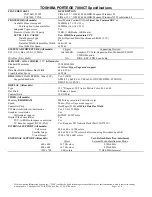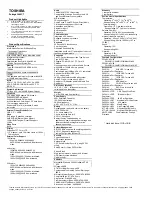
8
dissipation on the underside can result in uncomfortable
overheating.
• This device is not suitable for use with VDU workstations.
4.6. Environmental Requirements
• The notebook is most reliably operated at an ambient
temperature between 5 °C (+41 °F) and 30 °C (+86 °F) and
at a relative humidity between 20% and 80% (without
condensation).
• When powered off, the notebook can be stored at
temperatures between 0 °C and 60 °C (+32 °F and 140 °F).
• During a thunderstorm, unplug the AC adapter from the wall
outlet. For extra safety, we recommend using an overvoltage
protection device to prevent the notebook from sustaining
damage as a result of power surges or lightning strikes.
• After transporting the notebook, wait until the device has
reached room temperature before switching it on. Large
changes in temperature or fluctuations in humidity can cause
moisture build up within the notebook due to condensation.
This can cause an electrical short circuit.
4.7. Power Supply
CAUTION!
Risk of electrical shock!
There are live components inside this AC adapter. In
the event of an unintentional short circuit of this AC
adapter, there is a risk of electrical shock or fire!
`
Do not open the housing of the AC adapter.
• The wall wall must be close to the notebook and easily accessible.
• To disconnect the power supply from your notebook (via the
AC adapter), pull the plug from the power outlet.
• Plug the notebook’s AC adapter into AC 100 – 240 V~ 50/60 Hz
earthed sockets only. If you are not sure about the power supply
at the set-up location, please ask your electricity supplier.










































